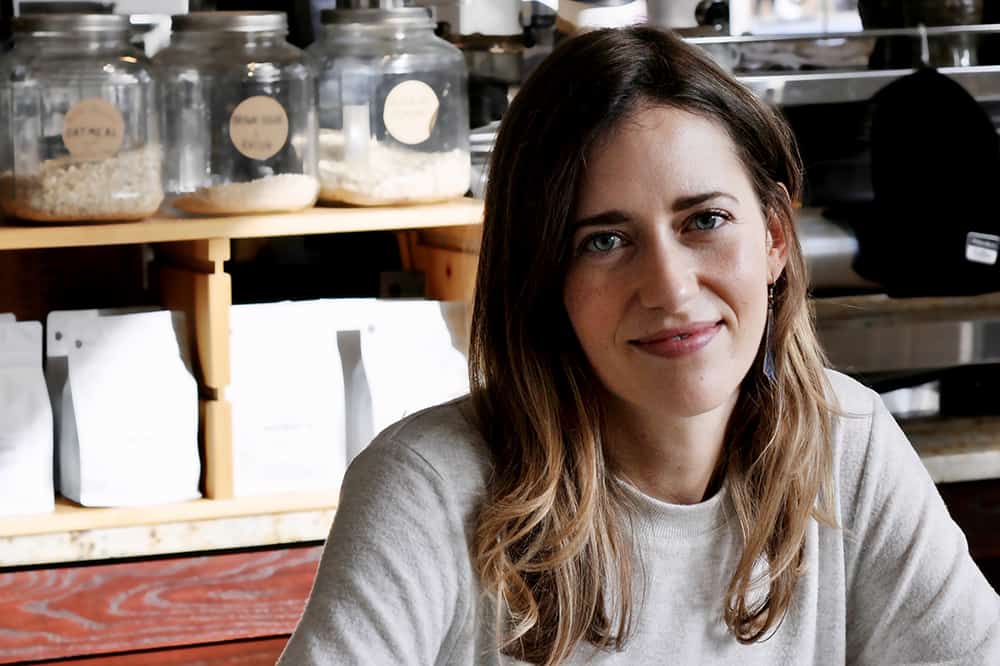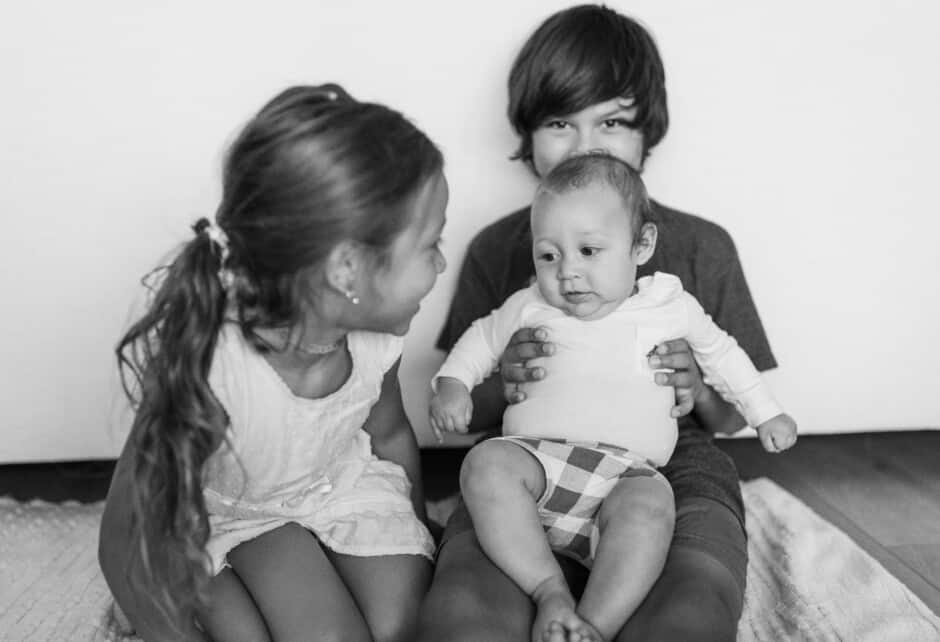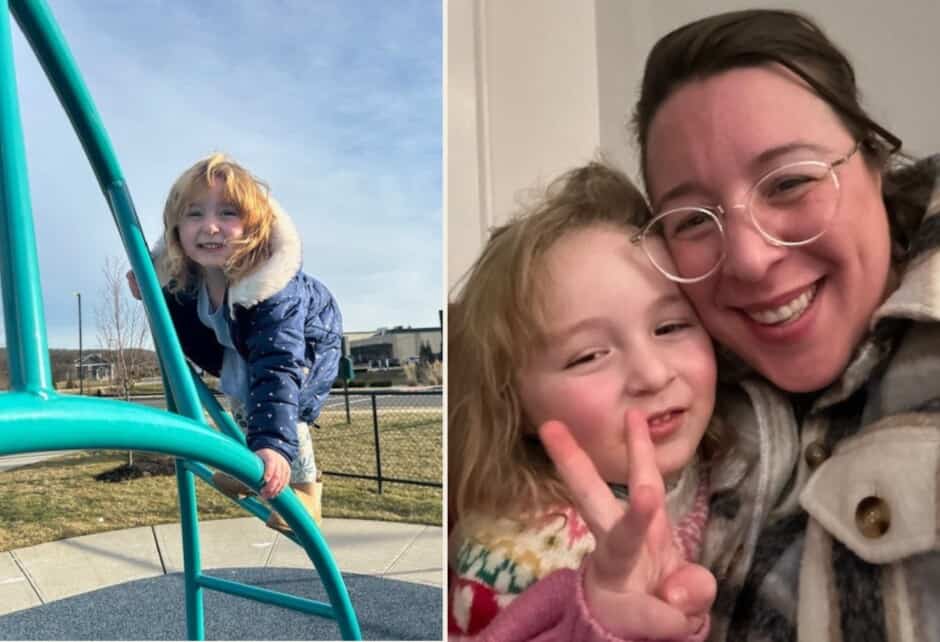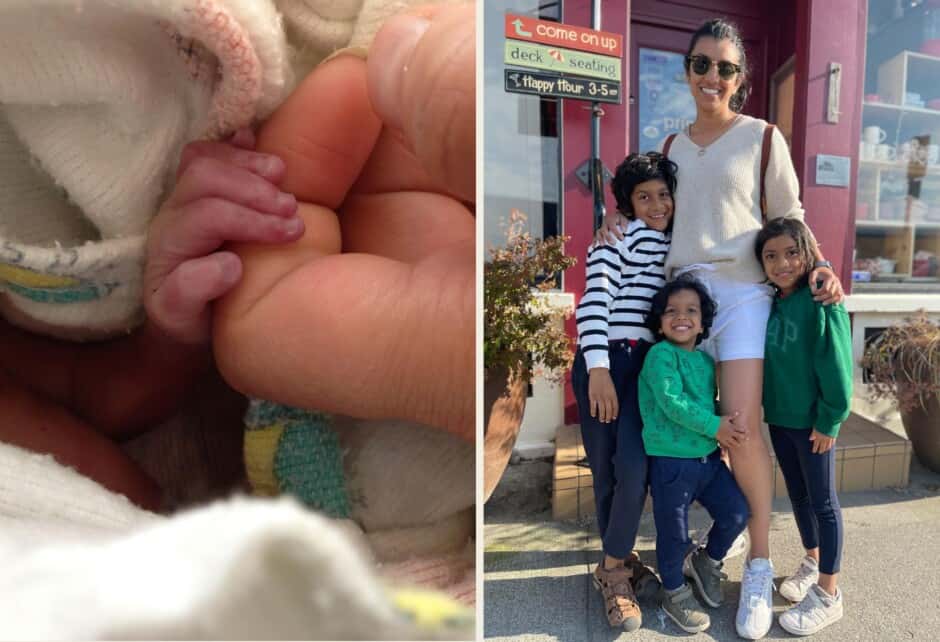
Mom Talk: How a Breakdown Made Me a Better Mom
Written by Katie Hicks Stout
Photography by Photo Courtesy of Katie Hicks Stout
If you’ve ever felt the walls closing in on you, today’s Mom Talk essay will likely feel familiar. And even if you haven’t, we still think parts of it will likely feel relatable—especially after the year we’ve all had. Below, Cincinnati-based copywriter, creative consultant, and new mom Katie Hicks Stout recounts how a medical crisis changed her point of view on motherhood, her partnership, and her life.
When I think of emergency rooms, I imagine broken bones, gross wounds, and Covid-19. So, I must have been a sight when my husband carried me into an ER at 10 a.m. on a Tuesday. I was wearing pajamas and clutching a bright blue bucket—the picture of physical and mental health. I couldn’t lift my head or walk without being dragged, and I’m certain I was paler than this Word document’s blank page. My head and body were screeching in pain and I couldn’t stop vomiting, even when there was nothing left to give.
I wanted to wear a sign that said “not contagious.” But while I couldn’t spread my illness, it wasn’t isolated to me.
28 million women in the U.S. suffer from migraines, and I have been one of them for 16 years. Migraines affected my performance in school, then work, and later with my husband and child. The body-searing episodes started when I was 19 years old, coinciding with my first experience of feeling both used and rejected by a boy.
My migraines intensified with stress and I chose a career path that provided plenty of that. Once at 25, I spent an afternoon vomiting in the handicapped bathroom of my office in lower Manhattan. I worked for an advertising agency that required a lot of hours, travel, and submission to other workaholics. It was the kind of job that could indoctrinate you to the idea that stress is a form of overachieving.
Over those 16 years of migraines, I missed birthday parties, holidays, concerts, wedding dress shopping with my best friend, and days upon days of work. Throughout that time, I popped Imitrex, which is both an anti-depressant and a migraine treatment, for relief. The week before I finally went to the emergency room—at age 35 with a 7-month-old during a pandemic—I’d taken nine pills without reprieve.
I wasn’t always like this. Late in my pregnancy, when the aptly named hormone relaxin was surging through my body, I experienced miraculous relief from migraines and whole-body tension.
After my daughter was born, I experienced new heights of anxiety, stress, and fear. I woke at night, worrying about whether Elodie was cold or if she drank enough breastmilk and formula. I shook with fear when I tried to breastfeed her because my nipples bled, and I didn’t understand “the right way” to hold her.
My concern for our tiny infant changed as she grew. I returned to my work as a consulting copywriter, but I was quarantined at home and always with Elodie nearby as my husband cared for her in our one-bedroom apartment. My body’s stress system powered back on and so did my ability to shower myself with negative thoughts and resentment.
This is the appropriate time to judge me.
I loved my daughter and my husband, but I could not stop finding fault with them. I could only ruminate on what I missed: slowly drinking a pour-over coffee, working out at midday, long stretches of sleep, wasted time, silence. I was trapped in a cycle of undying love and self-inflicted torture. And I could not see a way out or to get to the bright side of things.
When I laid in the hospital bed, I told the ER doctor: I wasn’t sleeping, working with a baby nearby was too much, my body still hurt from delivery, and all I wanted was a trap door out. My husband sat quietly, patiently by me. Never showing offense or anything less than care.
The doctor, a brusque but unexpectedly attuned person, said my affliction was tension. It locked up the muscles in my back, neck, and shoulders and creeped vine-like over my head. And the grotesque ivy was pulling me down deeper into depression.
Well, that’s how I describe it to myself now. The doctor simply said: Ibuprofen at the first twinge of muscle tightness, muscle relaxers after that, and Valium if necessary.
The ER nurse gave me an IV of what she called a “happy meal,” a combination of Valium, Benadryl, morphine, and something to keep me from getting nauseous. At the mention of morphine, my husband asked if we were in World War II. I chuckled but didn’t protest. I was busy lifting off to a sleepier, dreamier place. I slept the day away at home, and while I disliked the feeling of being on drugs, I loved that no one could ask anything of me.
My recovery was not immediate. After my day-long haze, I went back to working the next day and resumed caring for my daughter. It was still difficult, but I was beginning to see that without the influence of other parents who knew better, I was making things really hard on myself.
My daughter was big enough to sit in a highchair rather than me hunching over her, attempting to feed her in my lap. I had a very comfy couch, and yet I would sit on the cushion’s edge, perched on my tip toes to give her the perfect seat for every bottle feeding. And why did I constantly offer to do things for my daughter when my capable husband was caring for her and I was meant to be working? Most of those accepted offers came with my cloak-and-dagger resentment anyway.
Physical revelations improved my relationship with my daughter, but it was a fight that improved my relationship with my husband.
Despite the security of having my husband care for our child all day, I felt pulled toward the traditional. A part of me wanted Josh to have a full-time job with medical insurance and a 401k. And, if he wasn’t doing that, I certainly didn’t want to be doing the dishes and cleaning up when I was done with work at 5 p.m.
He was (and is) a muralist and artist when he wasn’t caring for Elodie. Some of his work carried over too much into the day. Dishes were left in the sink so he could finish a painting while she napped. The floors were dusty because he needed to finish an illustration for his Instagram. If he was going to be a stay-at-home dad, I needed a little more domesticity.
On the other hand, it turned out that we weren’t living solely on my income this whole time. He paid for our wildly expensive COBRA insurance, our new appliances, and the utilities. I paid the mortgage, and we split the home and car insurance and groceries. He never asked anything from me, and our money was separate. What’s more, he was keenly aware of my internal criticism of him. He was afraid that I’d eventually tire of him as a stay-at-home parent and divorce him. And where would that leave him?
Suffice to say, a shift needed to happen. At first, Josh cleaned more and created less. Then created a little more (was happier) and cleaned a little less. But there was still equilibrium. For my part, I stopped telling myself a story of martyrdom. It turned out that we were financially stable with a happy, growing daughter whose needs required me to prioritize.
Since this revelation, I’ve made more mental adjustments. “Better out than in” is my 2021 motto. It reminds me that it’s better to blurt out how I feel—even when it seems rude to my Catholic-raised, guilt-laden soul—rather than stuff it down. This in addition to the refrain “Why do I feel guilty and is it justified?” have helped me stabilize. Plus, working from a parent’s empty house a couple days a week along with daily yoga has done wonders.
So, how might all this help you?
I’d urge you to be honest with yourself and others, even if it results in a disagreement. If you need certain expectations to be met, speak up. When you’re wrong, be willing to change.
Rather than fall into a pit of despair, ask the people you love for help and support. It’s OK to say you’re having a hard time. Tell your life partner, family, or friends exactly what you need to feel supported.
Don’t forget to look at yourself, too. How are you describing your life and the people you love? Is that true or does it just feel righteous? It’s hard for us to let go of the stories we tell ourselves, but it’s never too late to be honest and vulnerable. Our time is short; our options are vast. Be brave. Your happiness depends on it.
Are you a mother with something to say? Send us an email to be considered for our “Mom Talk” column.
Write a Comment
Share this story




This resonates wildly with my experience as a working mom with a SAH dad. Thanks for sharing!